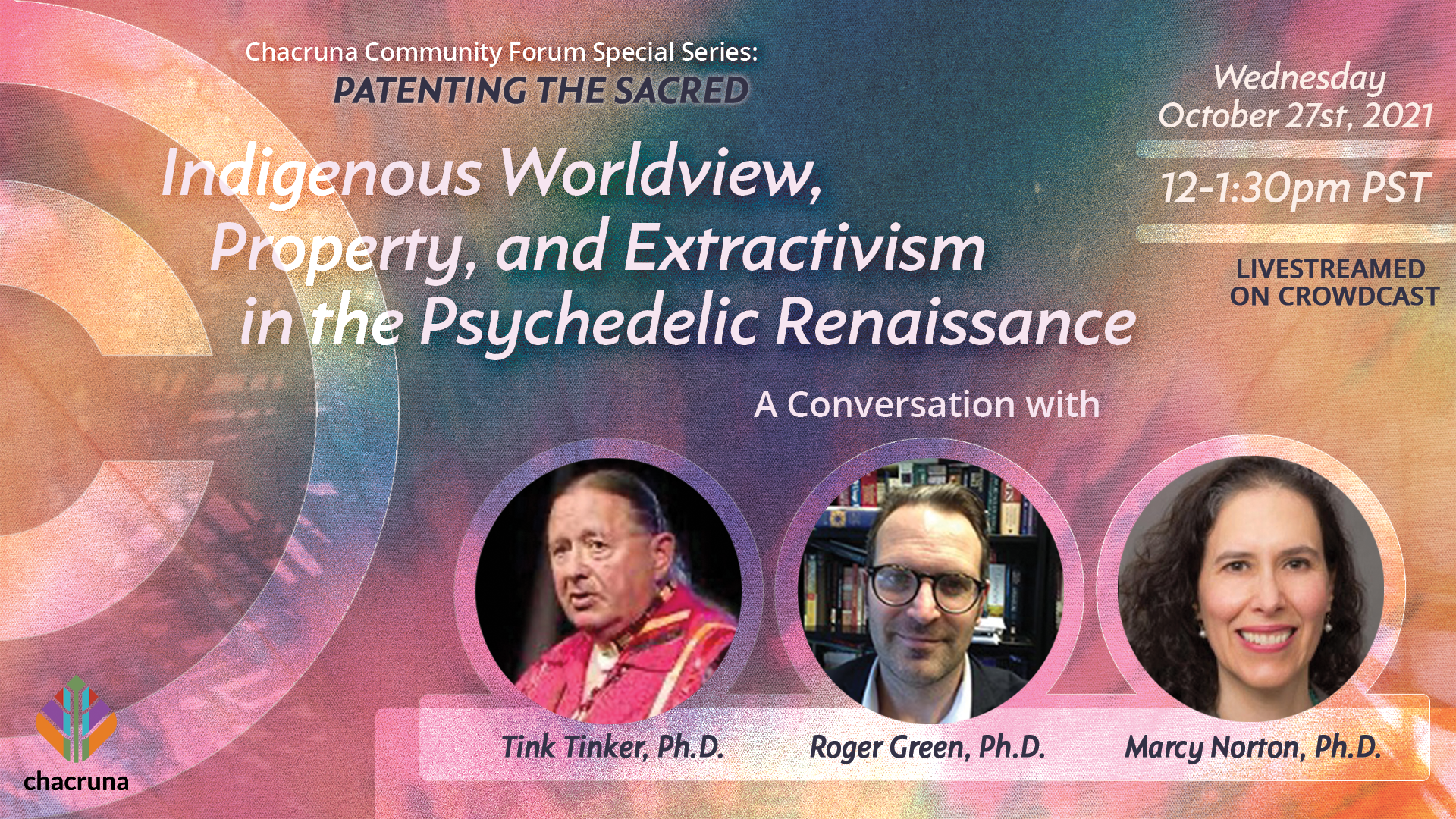- Course: Roots of Psychedelic Therapy: Shamanism, Ritual and Traditional Uses of Sacred Plants - June 6, 2025
- Indigenous Knowledge in the Digital Age - June 5, 2025
- Meet Chacruna at Psychedelic Science 2025 - June 5, 2025
Wednesday, October 27th 12-1:30 PM PST
We hear a lot these days about the ‘psychedelic renaissance’. An explosion of interest in newly synthesized substances collided with an increasingly globalized world in the second half of the twentieth-century. New religious movements, ethnographic and archaeological studies, and worldwide attempts to control “drugs” around the world brought the use of various plants to broader discussions of (westernized) medicine and intellectual property. Along with globalizing impulses, and following largely western scholars’ impulses to universalize, a rhetoric of “the sacred” has emerged with respect to Indigenous uses of plants in particular but also among synthesized psychedelic substances as well.
As we consider the recent discussions and debates, it is useful to be aware of a much longer extractive history of various substances and the impulse to impose eurochristian notions of “the sacred” onto substances / persons decontextualized from traditional Indigenous uses. In this discussion, we will hear from Professor Tink Tinker (wazhazhe / Osage Nation) concerning the difficulty for the very notion of “property” (intellectual or otherwise) and the impact of extractive thinking on Indigenous worldview. We will also hear from Professor Marcy Norton, author of Sacred Gifts, Profane Pleasures: A History of Tobacco and Chocolate in the Atlantic World. Norton’s work addresses the European reception of substances / persons that have become commoditized and made rather mundane but that maintain traditional ceremonial uses for Indigenous people. Roger Green of Metropolitan State University of Denver will moderate the discussion.

Tink Tinker (Eagle Clan, wazhazhe / Osage Nation) is Clifford Baldridge Emeritus Professor of American Indian Cultures and Religious Traditions at Iliff School of Theology. His publications include American Indian Liberation: A Theology of Sovereignty (2008); Spirit and Resistance: Political Theology and American Indian Liberation (2004); and Missionary Conquest: The Gospel and Native American Genocide (1993). An edited collection by Miguel A. De La Torre, The Colonial Compromise: The Threat of the Gospel to Indigenous Worldview (2021) celebrates Dr. Tinker’s career and teaching. Dr. Tinker volunteered in the Indian community as (non–stipendiary) director of Four Winds American Indian Survival Project in Denver for more than two decades. In that capacity he functions in the urban Indian community as a traditional American Indian spiritual leader. He is past president of the Native American Theological Association and a member of the Ecumenical Association of Third World Theologians. He has been active in volunteer capacities with several denominations at the national level, the National Council of Churches and the World Council of Churches. He currently serves as an “Honorary Advisor” to IMADR, the International Movement against all Forms of Discrimination and Racism; and he also serves locally on the Leadership Council of the American Indian Movement of Colorado.

Marcy Norton (Ph.D. Berkeley) is a historian of the early modern Atlantic World at the University of Pennsylvania, with a focus on Latin America and Spain. Much of her research is guided by two questions: How did colonialism shape the Americas? And how did Native America shape European modernity? Thematically she is most interested in writing history that explores the intersections of environment, embodiment, and thought, concerns that have guided her work on the history of food, drugs, science and inter-species relationships. Her publications include Sacred Gifts, Profane Pleasures: A History of Tobacco and Chocolate in the Atlantic World (Cornell University Press, 2008, winner of the best book prize from the Association for the Study of Food and Society), “Subaltern Technologies and Early Modernity in the Atlantic World” (Colonial Latin America Review, 2017) and two articles that appeared in American Historical Review, “Tasting Empire: Chocolate and the Internalization of Mesoamerican Aesthetics (2006) “The Chicken or the Iegue: Human-Animal Relationships and the Columbian Exchange” (2015), which won the Council on Latin American’s history Vanderwood prize for the best article in Latin American History. She also co-edited (with Ralph Bauer) a special issue of Colonial Latin America Review entitled Entangled Trajectories: Indigenous and European Histories. (2017). She is currently finishing a book about colonialism and human-animal relationships in early modern Europe and America, which will be published by Harvard University Press.

Roger Green is a Senior Lecturer in the Department of English at Metropolitan State University of Denver. He’s the author of A Transatlantic Political Theology of Psychedelic Aesthetics: Enchanted Citizens (2019) and the recent dissertation, Ayahuasca in the Wake of the Doctrine of Discovery (2020). He has collaborated musically with Anne Waldman on Untethered I (Fast Speaking Music 2017). He’s also contributor to an edited collection by Miguel A. De La Torre, The Colonial Compromise: The Threat of the Gospel to Indigenous Worldview (2021), which celebrates Tink Tinker’s career and teaching. He’s currently co-authoring a book with Tink Tinker on eurochristian worldview.
Take a minute to browse our stock:
Did you enjoy reading this article?
Please support Chacruna's work by donating to us. We are an independent organization and we offer free education and advocacy for psychedelic plant medicines. We are a team of dedicated volunteers!
Can you help Chacruna advance cultural understanding around these substances?














